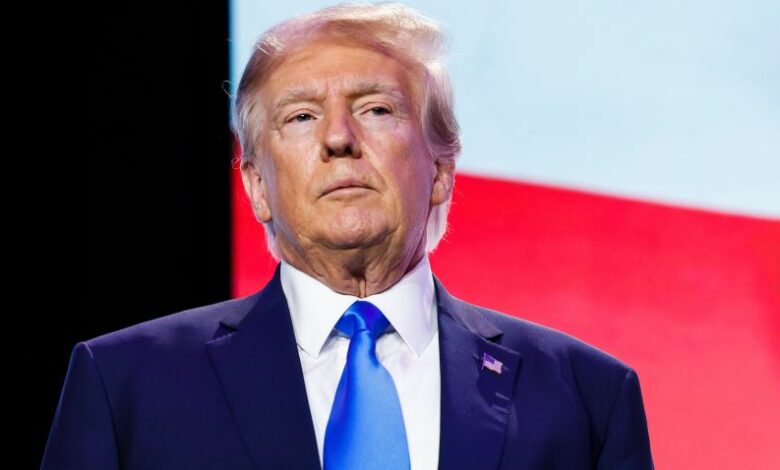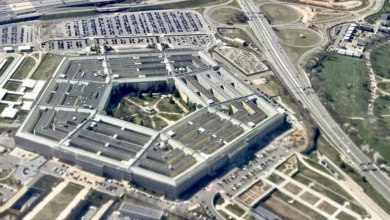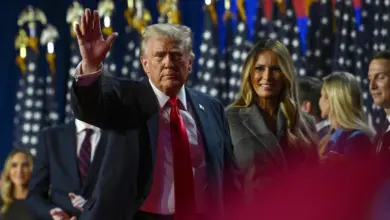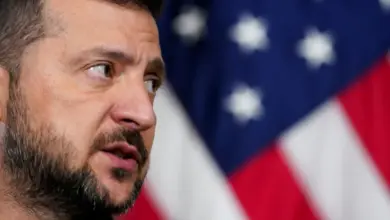
Donald Trump’s request to the Supreme Court on Wednesday was perhaps his most brazen delay tactic yet.
He urged the high court not to get involved right now in the question of whether he is immune from federal prosecution for alleged crimes committed while in office – his latest attempt to ask the legal system to effectively bend to his political will.
The move echoed what Trump’s legal strategy has been in all of his criminal cases to date – to delay the proceedings, ideally beyond the 2024 election.
It came less than a day after the Colorado Supreme Court’s stunning decision to bar Trump from appearing on the state’s primary ballot, a ruling that he is also expected to appeal to the US Supreme Court.
That means that the nation’s highest court is poised to consider next year whether Trump can be prosecuted for crimes committed after the 2020 election and whether the actions he took in office can bar him from being on the ballot again in 2024.
It’s just the kind of chaos where Trump thrives – and finds a way to turn the tables to his advantage.
“He feeds on grievance just like a fire feeds on oxygen. And this is going to end up as a grievance that helps him,” former Trump Attorney General Bill Barr, who is opposing Trump’s 2024 candidacy, told CNN’s Jake Tapper when asked about the Colorado ruling.
On Wednesday, Trump’s lawyers asked the Supreme Court to reject special counsel Jack Smith’s request to bypass a federal appeals court and take up the case deciding if Trump, as a president, is immune from charges related to election subversion efforts after his 2020 loss to Joe Biden, a decision that could ultimately shape the former president’s legal fate.
The speed with which the Supreme Court takes up the case, which has been paused while the immunity question is being decided, will determine whether the case begins in March 2024, just before Super Tuesday, as Judge Tanya Chutkan has planned – or if the case gets kicked closer to or after November’s election.
It’s hardly the first time Trump has turned to the Supreme Court. After his election loss in 2020, he asked the justices – three of whom he appointed – to help overturn his defeat, and he publicly expressed his displeasure when they swiftly dismissed a lawsuit challenging the election results.
Now Trump, the front-runner for the GOP nomination, is looking for help from the Supreme Court in his 2024 campaign – just weeks before the first votes are cast in the primary. The dual-track Trump litigation puts the court – and the country – in an unprecedented and chaotic position that is sure to inflame the partisans no matter how the court rules.
Trump’s GOP rivals once again defend him against the legal system
The Colorado ruling, where a 4-3 majority found that Trump engaged in an insurrection and was not eligible to appear on the state’s primary ballot because of the Constitution’s 14th Amendment, once again drowned out any other news involving the GOP primary, where candidates are facing a narrowing window to gain on the former president.
It’s the same scenario that played out following each of Trump’s four indictments, when any attempt by one of Trump’s rivals to gain the spotlight was met with the force of the unprecedented criminal charges against a former president.
Some of Trump’s opponents used the news to make arguments about Trump’s electability, but they once again rallied to Trump’s defense against the country’s justice system, joining Trump’s allies to criticize the Colorado ruling.
Even former New Jersey Gov. Chris Christie, who has defended the special counsel’s charges against Trump, said that the courts should not be deciding Trump’s electoral fate – the voters should.
Biden didn’t weigh in on the Colorado ruling specifically Wednesday – but he did take the opportunity to accuse Trump of participating in an insurrection.
The president’s comments were a reminder that 2020 will be a key part of any Trump-Biden rematch – even if the campaigns themselves wish to focus on other issues.
“I think it’s self-evident” that Trump is an insurrectionist, Biden told reporters upon arriving in Milwaukee Wednesday.
“Whether the 14th Amendment applies, I’ll let the court make that decision,” Biden said. “But he certainly supported an insurrection. There’s no question about it. None. Zero.”
Delaying past November is the ultimate goal
If Trump were to lose on the question of presidential immunity at the Supreme Court, it clears the pathway for the special counsel’s January 6, 2021, trial to begin in the spring.
It’s why Smith asked the Supreme Court to take the case even before a federal appeals court in Washington, DC, hears the matter. Waiting for the appellate court to decide a matter that is all but assured to be appealed to the Supreme Court anyway could push the federal trial well past the scheduled March 4, 2024, date that’s now on hold.
Trump’s lawyers have not hid the fact that they’d like to push that federal trial – and the other criminal cases that are looming – beyond the 2024 election, where, if Trump wins, he could pardon himself.
“Not surprisingly, former President Trump’s opposition focuses on the timing of the Court’s review, and not the inevitability of having the court resolve whether he is immune from criminal prosecution eventually,” said Steve Vladeck, CNN Supreme Court analyst and professor at the University of Texas School of Law.
In their filing opposing Smith’s request, Trump’s lawyers conjured up all the outrage they could at Smith’s desire to push up the timeline, suggesting the special counsel was seeking to have the court make a decision “with reckless abandon.”
“The Special Counsel urges this Court to bypass those ordinary procedures, including the longstanding preference for prior consideration by at least one court of appeals, and rush to decide the issues with reckless abandon,” attorneys for Trump wrote.
“The fact that this case arises in the vortex of political dispute warrants caution, not haste,” Trump’s lawyers added.
A pivotal role for the Supreme Court in 2024
In Colorado, meanwhile, Trump has until January 4 to appeal the state Supreme Court decision to the US Supreme Court.
Trump’s lawyers aren’t planning to file their Supreme Court appeal this week, according to two sources familiar with the matter.
But once Trump’s attorneys do appeal, the issue will be in the hands of the Supreme Court. Whether that happens before or after the high court hears the question of presidential immunity remains to be determined.
The two cases mean that the Supreme Court, like it or not, will play a key role in the 2024 election.
The court could decide that Trump is immune from prosecution while president, freeing him of some of the criminal charges he faces and giving him a runway to act as he pleases in a possible second term.
Or, the high court could decide that Trump can, in fact, be removed from the ballot as the Colorado Supreme Court did, inviting other states to do the same and potentially depriving him of a path to the White House.
It’s also possible – perhaps likely, even – that the court lands somewhere in between those two poles. But every action the high court takes, no matter how small or procedural, is going to come under intense scrutiny.
And Trump’s action Wednesday shows he’s going to try to work the high court just as he has bludgeoned the legal system for decades in New York and Washington, skirting and blurring the lines as both a real estate developer and then as president.




